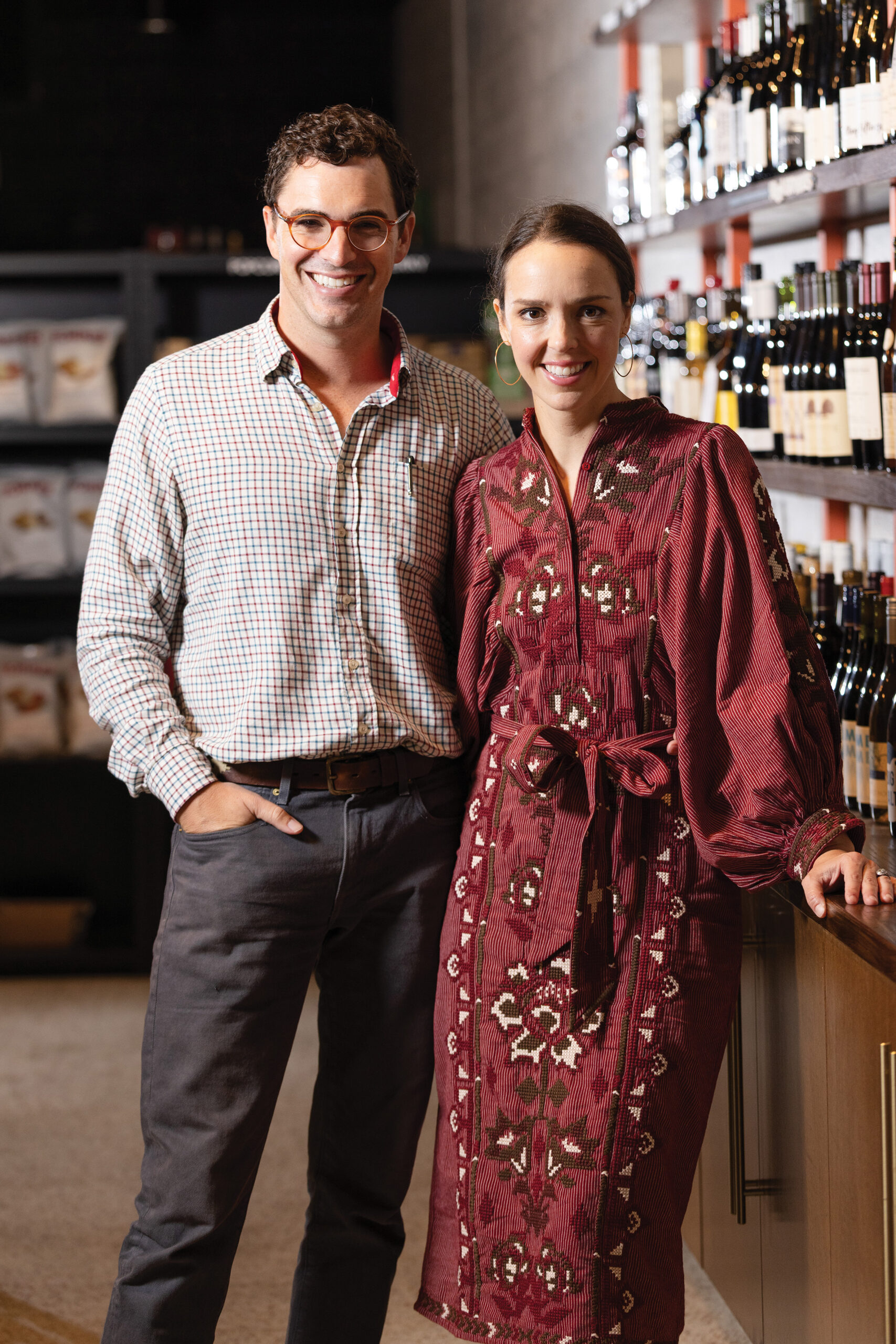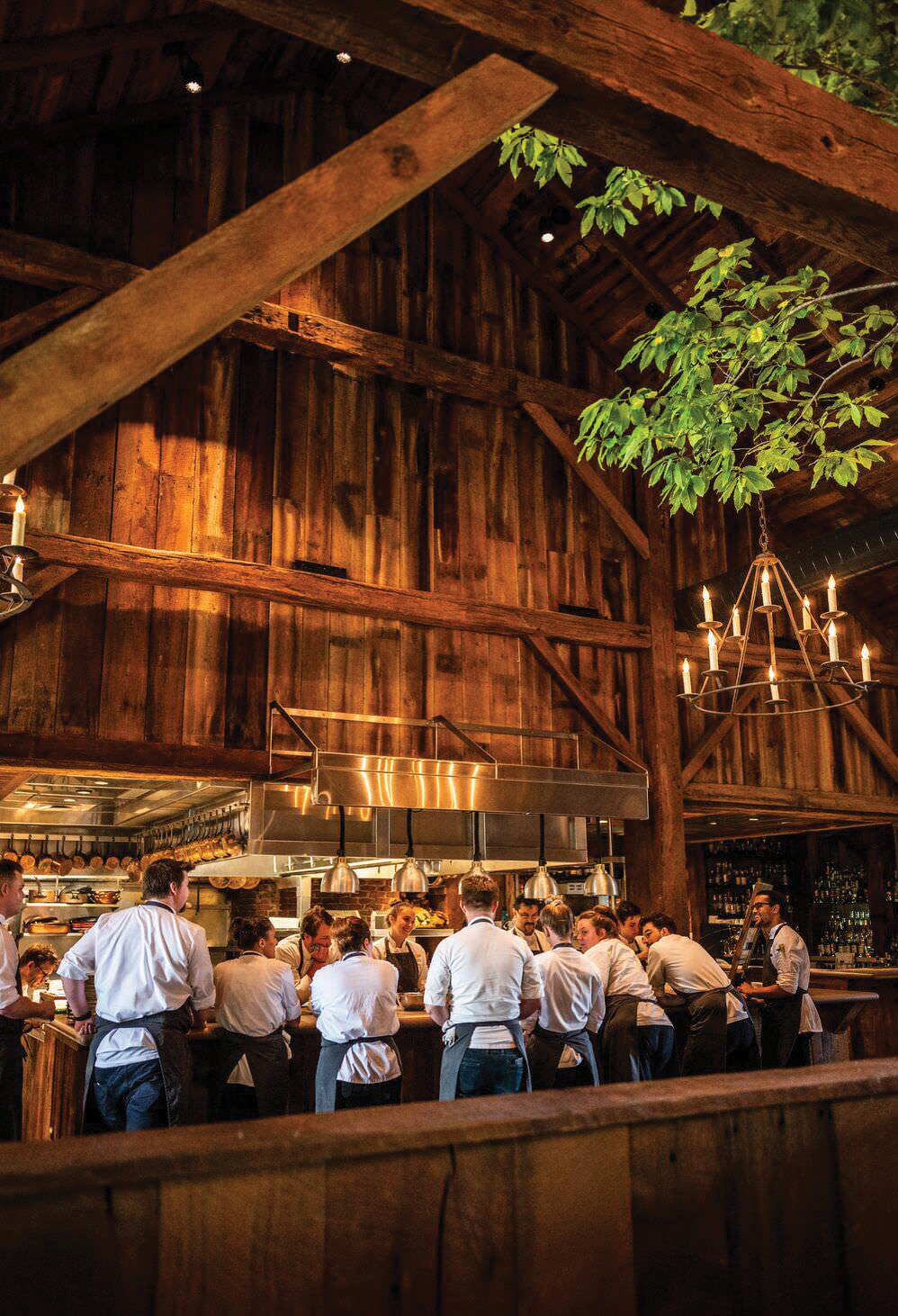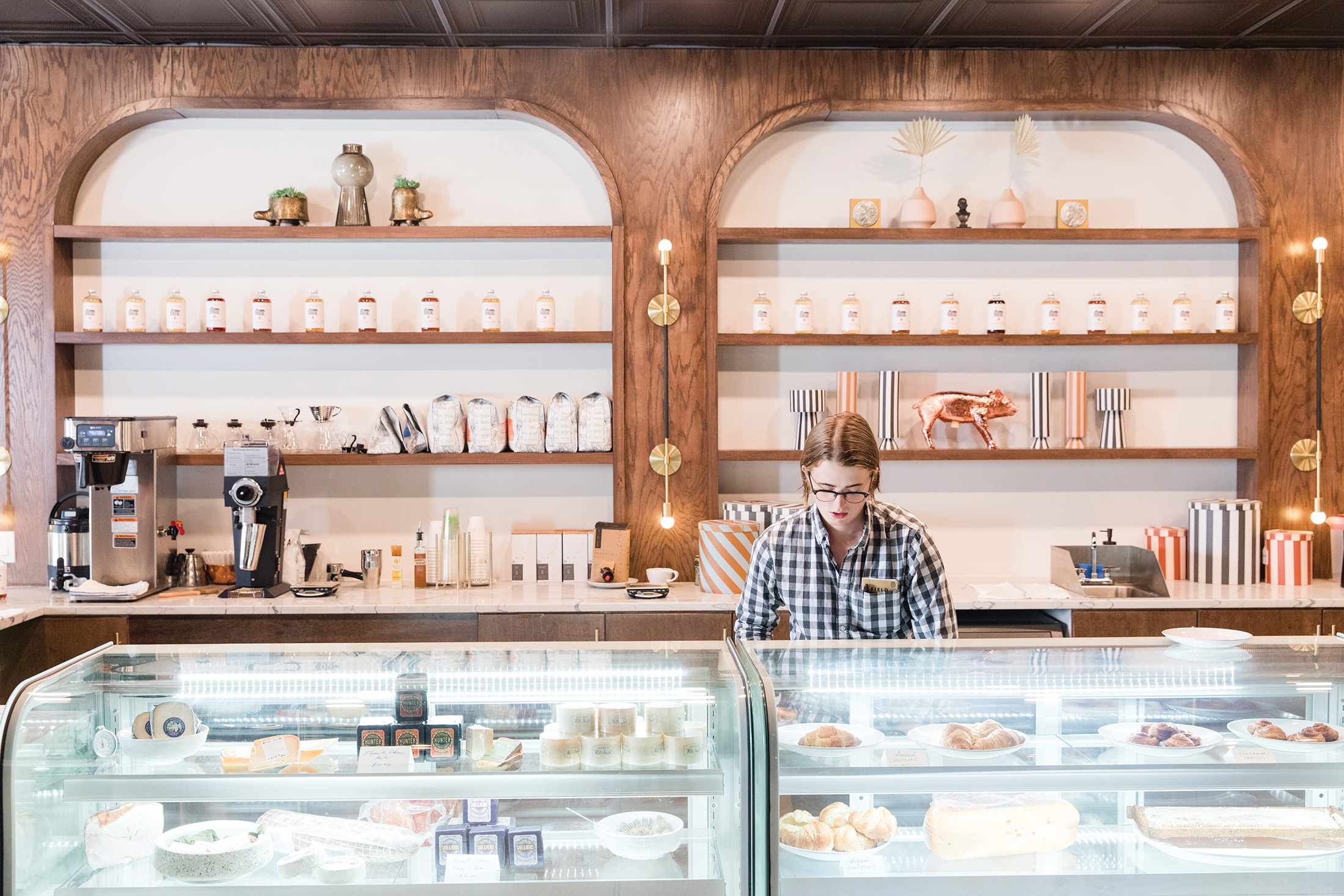
It would be easy to assume that Elisabeth and William Hanes have always led a charmed life. Provision, their thriving business in downtown Fairhope, draws a crowd every day from breakfast until happy hour. Patrons flock here for wine and seasonal espressos; fresh breakfast and lunch menus; gift-worthy retail and epicurean groceries.
But rewind the tape 15 years, and you’ll find the couple in a very different place: newly married, waiting out the Great Recession in a shabby rented bedroom in Redding, California, barely getting by.
They’d first met as college students just up the road from Redding at the Christian camp JH Ranch, where they’d worked for a summer. Now they’d come back to California as newlyweds, hoping to reshape their lives after throwing in the towel on William’s first career, at an apartment brokerage in Birmingham. As much as he’d loved that job, it had turned out not to be an ideal place to work during the collapse of the real estate market.
In search of new direction, they had decided to enroll in a one-year ministry program at Bethel, a revivalist church in northern California.
It was, remembers William, an insane way to start a marriage. “We learned a lot. It was a great way to start our marriage,” countered Elisabeth. “But we were living on next to nothing.”
When they moved to California, they had $10,000 in savings. It felt like a lot of money — enough to get by until they found work, at least. “We kept trying to get jobs,” said Elisabeth, “but even the fast-food restaurants were like, ‘You don’t have enough cash-handling experience.’” They were willing to learn, but the town was flooded with students who already had experience. So instead, they stretched their savings as far as possible.

Then, one weekend, Elisabeth’s parents flew to San Francisco for a quick visit and threw them a lifeline. Elisabeth had made them all a reservation at a hotel that looked cute online but turned out to be terrible in person. Think abandoned lobby. Think bizarre teddy bear collection. When her dad saw the place, he put his foot down and booked them a stay at The Ritz.
Coming from their house in Redding, The Ritz felt like a healing balm to the couple. “They just made our bed and were kind when we walked in, and we felt cared for,” said Elisabeth.
After that weekend, back home in their damp room, a dream blossomed between them. What if they opened their own small inn on the western shore of Mobile Bay?
“We’ve always loved design, beauty, architecture. It’s something we’ve shared as a hobby. We’d drive around and look at that stuff and read about it. So it felt like hospitality could pull in some of those passions and be a way to care for people,” said Elisabeth.
On a practical level, they knew they needed to learn more about the service industry. “It was sort of obvious and immediate: We both thought we should train at Blackberry Farm,” said William.
Nor did they personally know Sam Beall, the proprietor and a native Mobilian, but through mutual Port City connections, they were able to get a meeting with him. They flew from California to Tennessee and delivered their pitch: “We really want to open a hotel one day,” said William. “We don’t know anything. We need to learn. We’d really like to work in every department on property.”
Neither of them had been to the iconic resort in the Tennessee mountains, but they knew of it as a paragon of excellence, very Southern and true to place.
Beall agreed to take them on as trainees, so they wrapped up their year in California and moved to Tennessee, with income finally allowing a merciful upgrade to an adorable rental farmhouse surrounded by cows.

Today, Blackberry Farm has a formalized management training program, but back then, Beall built a program just for them. They rotated from housekeeping to sales, finance to front desk, food and beverage, spa, retail, the garden.
“There are a lot of things about excellence in service that I think stick with anybody that works there,” said William. “Like, ‘Yes is the answer. What’s the question?’ Carrying that attitude in the service industry has certainly stuck with us.”
They worked a ton, including holidays. Any time they had a day off, they were happy to pick up extra shifts. “We were there to work, to learn. So we were always like, ‘Sure, sign me up,’” said Elisabeth.
After a year and a half, they had worked in every department. Faced with the decision to stay on at Blackberry in permanent roles or set off on a fresh adventure, they decided to decamp for another resort to see what new knowledge they could soak up.
But then William’s uncle, Sandy Stimpson, knocked their train off its tracks with a big family announcement: He intended to run for mayor of Mobile.
“Growing up, I always just loved Mobile, and I always was interested in politics and government,” said William. In college, he and a friend had even started a company called Discover Mobile, getting funding from the Convention and Visitors Bureau to promote Mobile on college campuses.
“So I told Elisabeth, ‘I know this doesn’t make any sense, but we should move back to Mobile, and I’ll try to work on Sandy’s campaign. And then after we do that, we’ll get right back on track, because campaigns are short.’” Together, they agreed set to their hospitality dream aside, just for a few months.
Somehow, six long years passed. Their twenties gave way to their thirties. William kept working for Stimpson after their successful campaign, then naturally segued into a job managing government affairs at telecom company Southern Light. Elisabeth planned weddings, worked for nonprofits, stayed home with their two young sons. They moved into a fixer-upper in Fairhope. They found contentment, even as they drifted further and further from their dream. Occasionally they would toy around with a creative idea, but the right doors never seemed to open.
They started to feel as though all that hospitality training had been a waste. Sometimes one would ask the other: “Do you regret that we did it?” And the other would offer a reassuring “no.”
“We can throw a great dinner party,” joked William.
That could have been the end of the story. William might have stayed at Southern Light until he retired. But when the company was sold to Uniti, the shifting corporate structure shook him out of his complacency. It wasn’t so much a lightbulb moment as a slow revival that crackled and grew. A friend offered a suggestion: Open a market in Fairhope.
They’d played around with the idea of a market once before, in Mobile. They’d even gotten as far as to ask Charlie Modica, owner of Modica Market in Seaside, Florida, to look at a building on Dauphin Street with them. He’d steered them away from that location, pointing at the one-way streets. People will just drive by, he told them. They won’t stop and come in.
They still liked the market idea, though. It pulled in all the things they loved best about hospitality — food and beverage, retail, design — but unlike a hotel, they could close a market on holidays to be with their boys.
Then, one day, William ran into Realtor Jeremy Milling, and Jeremy mentioned a building he owned in downtown Fairhope. “I kind of want to do something interesting there,” William remembers him saying. “You have any ideas?” As a matter of fact, William told him, he did.
Modica looked at the Fairhope space, and this time, he gave the location his blessing. “That felt really good, because he’d been such a hard ‘no’ the time before,” said Elisabeth.
They began to turn their shaggy idea into a real concept. The Provision that exists today, with a kitchen and extensive coffee menu, isn’t exactly what they originally had in mind. “We thought more grocery. Definitely wine and grocery,” said Elisabeth. “We didn’t know we were going to have an espresso machine at first.”
“Which is shocking to think about, because many people think of Provision as a coffee shop,” said William.
More and more pieces started falling into place. They found partners, and money. Everything seemed to be heading in the right direction — until suddenly, it wasn’t. On William’s last day at Uniti, in early 2020, he went out to lunch with colleagues and spotted his uncle Sandy. William went to shake his hand. Instead, his uncle offered him an elbow bump.
It was the first sign that 2020 was going to be a strange year. “But it was William’s last day,” said Elisabeth. “It was too late to turn around.”
They had both planned to throw themselves into work as they counted down the days toward grand opening, but when their children’s preschool closed, they suddenly had to juggle childcare on top of everything else. And then, when the entire world shut down, their opening plans went straight out the window. They wondered if Provision would die before they ever opened their doors.
Then the state suddenly reopened, and their holding pattern gave way to a mad rush. “We were literally training baristas how to do the espresso machine two days before we opened,” said Elisabeth.
“It was just a mess,” added William.
Once they opened their doors, business was uneven. “When case counts were low, we would be slammed,” William said. “Every day would be like a Saturday. It would be bananas. And the night times, it would be like a club in here … But then case counts would go up, and you would not see a car drive by.” On those slow days, they might have four customers total.
Elisabeth remembers standing at the welcome desk by the front door one day when a man walked up and said, point blank, “Y’all aren’t going to make it.” She was grateful she had on a mask, and he couldn’t see her mouth shaking as she held back tears.
But by the end of the summer, they finally started to feel like they were getting their feet under them. “And then Sally hit,” said Elisabeth, “and that really knocked the wind out of our sails.”
“I remember going to the gas station on 98, and I couldn’t get gas, and I just burst into tears,” said William. “I was like, ‘Oh my gosh, I can’t.’ We were so over capacity. It was like, there can’t be anything else wrong. I’m done.”
“But Provision had a generator, so we made drip coffee and sold that in the street,” said Elisabeth. “I felt like that was one of the first times we got to see the impact and the connection that Provision could have to the community.”

Now, five years later, community is a cornerstone of the business. The bustling space, with its lounge area and frequent events, is known as “Fairhope’s Living Room,” a title bestowed by a customer. It’s the realization of that heady vision they dreamed up all those years ago in California.
With success finally at their backs, they’ve been able to loosen their grip on the business a little, leaning on the expertise of their leadership team. It’s given them both space to pursue new projects: William is working with a partner to build homes in Point Clear, while Elisabeth has been designing interiors with her twin sister, hanging on tight as the business has grown faster than she expected. Even these new outlets feel like facets of what’s always captivated them: design, beauty, home.
“It’s funny, because the other day somebody said we were entrepreneurs, and I was like, ‘Oh no, we’re really not,’” said William. “And they were like, ‘Clearly you are.’
“I don’t feel that way. I don’t even feel like we’re very risky people. But the data says we are.”
Provision • 100 N Section St., Fairhope. provisionfairhope.com





